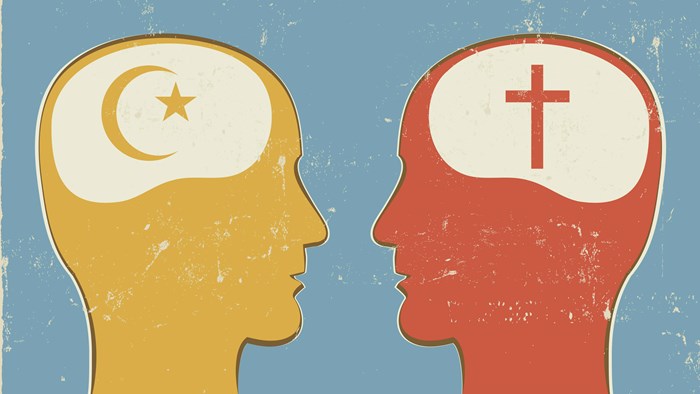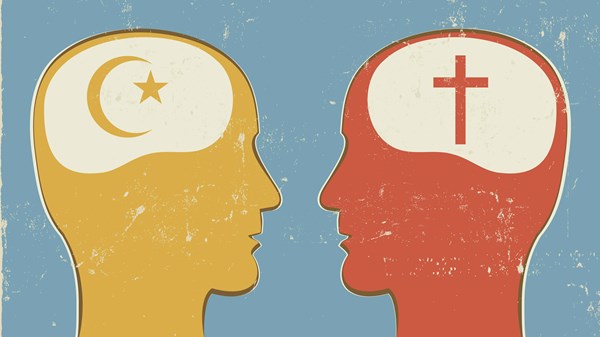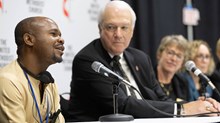

Do Muslims and Christians worship the same God?
Nearly two dozen evangelical experts on missions and Muslims have compiled their thoughts on how the answer affects Muslim missions, why it’s a bad question to begin with, and propose better questions to ask instead.
A 32-page, special edition of the Occasional Bulletin from the Evangelical Missiological Society (EMS) seeks to constructively contribute to the highly publicized dispute over whether Wheaton College should discipline professor Larycia Hawkins for stating in a Facebook post that Christians and Muslims “worship the same God.” [Arab evangelical scholars weighed in last week.]
Robert Priest, a mission and anthropology professor at Trinity Evangelical Divinity School (TEDS) and current EMS president, has “watched with interest” the unfolding Wheaton-Hawkins debate because, for evangelicals worldwide, “what Wheaton does affects us all.”
“As I’ve observed the unfolding drama, I’ve had concerns over the way Wheaton has framed the issues, over the repercussions of this for Christian witness, and over the failure to include missiologists and missionaries as interlocutors,” wrote Priest. “That is, for most evangelicals in America, our encounter with people who are Muslim is relatively recent, relatively superficial, and all-too-often infected by American culture-war impulses.
“The one category of American evangelical that has long nurtured close relationships with people who are Muslim is missionaries and mission professors (missiologists)—many of them Wheaton graduates,” he continued. “However, these individuals, who represent the heart of evangelical gospel concern, and who represent a unique mix of professional expertise and accumulated wisdom acquired over decades of study and ministry experience, do not appear to have been adequately consulted.”
The Wheaton-Hawkins debate has become “something of a Rorschach test,” wrote Brian Howell, an anthropology professor at the Illinois school asked to summarize the situation.
“For some it is further evidence of the narrow-minded, culturally- and racially-myopic nature of US evangelicalism, sliding into irrelevancy,” he wrote. “For others, it is a case of an institution standing up to the forces of liberalism and pluralism that would devalue the truth-claims of the gospel and Christian theological distinctives in the name of tolerance.”
For Priest, it was an opportunity to ask 21 missiologists and missionaries: “What are the missiological implications of affirming, or denying, that Muslims and Christians worship the same God?”
Their answers—which intentionally do not comment on the Wheaton-Hawkins situation directly—were published by EMS this month. (Most respondents are evangelicals, while one is Eastern Orthodox and one is Roman Catholic.)
In short: the answer is both simple and complicated.
“What other God is there?” asked Miriam Adeney, a world Christian studies professor at Seattle Pacific University. “In all the universe, there is only one God.”
Paul Martindale, a professor of Islamic studies and cross-cultural ministry at Gordon-Conwell Theological Seminary, agreed. “There is only one, true, creator God. The Bible is clear there is no other God.”
However, the experts agree that there are fundamental differences in the way that Christians and Muslims understand God.
“In contrast to Buddhism and Confucianism, for example, the Abrahamic faiths affirm God’s mercy expressed through his gifts in nature, human community, and scriptural wisdom and ethics and general guidance,” wrote Adeney. “Yet such mercy is a pale shadow of the shocking mercy that propelled Jesus to earth and to the cross. That radical mercy we call grace. If indeed the incarnation and death of Jesus are essential expressions of God’s nature, then Muslim and Christian understandings of God are truly very different.”
Acknowledging those differences is key, wrote David Cashin, an intercultural and Islamic studies professor at Columbia International University. “If there are no differences, then there is nothing to be learned and nothing to convert to.”
Understanding the differences—having a solid theology—must come before missiology, wrote Fred Farrokh, an international trainer with Global Initiative: Reaching Muslim Peoples, who was raised as a Muslim. “If we conform our theology to a pre-determined missiology, then we get the paradigm backward. Error will ensue, and we actually become incapable of missionally assisting those whom we yearn to help—in this case Muslims.”
Equating the way Christianity and Islam view God opens up other questions, wrote Sarita Gallagher, a religion professor at George Fox University. “For example, if Allah is God, then is the Islamic religion from God? Did Yahweh speak to Muhammad ibn ‘Abdullāh through the angel Gabriel in the Cave of Hira in 610 C.E.? If so, does the Quran contain new revelations from God?”
Different understandings of God might be compared to different understandings of Jesus, wrote Mark Hausfeld, president of Assemblies of God Theological Seminary and professor of urban and Islamic studies.
“Is the Jesus of the Church of Latter Day Saints’ Book of Mormon and Doctrines and Covenants the same Jesus of the Bible? How about the Jesus of the Jehovah’s Witness New World Translation of the New Testament?” he wrote. “Both books spell the name of Jesus the same, but the person and work of Jesus, as He [is] known in the Bible, is heretical. The use of the word Jesus is not wrong, but the context of the word Jesus is corrupted by the error of the context and meaning that defines the Person and work of Jesus as revealed in the Bible.”
The same is true for God, he said. “The word God is not misleading in itself, but the context of the Qur‘an defines a different God in nature and character.”
Practically speaking, though, it can be easier to reach out to Muslims if there is some common ground.
“Conversion studies have shown that the greater the degree of congruence between Islam and Christianity that is perceived by the Muslim inquirer, the more likely it is that he or she will seriously consider Christianity as a viable alternative to Islam,” Martindale wrote. If differences between the two are emphasized, the barrier to conversion grows.
“In my 30-plus years of interacting with Muslims, I have yet to meet a Muslim who believes that Allah is a different God from the Yahweh of the Bible,” he wrote. “Most former Muslims would also say that they had been attempting to worship the same God, but they later realized that the teaching and system of worshipping God in Islam were to some extent incorrect, false, and misleading.”
Telling Muslims that they worship a different God can shut the door to communication, wrote John Jay Travis, a missionary and Fuller Theological Seminary professor who has lived most of his adult life in Muslim neighborhoods in Asia.
“It makes it nearly impossible to read Scripture with Muslims, since a very significant percentage of Bibles found in predominately Muslims parts of the world use Allah,” he wrote. “It makes it very difficult to pray with Muslims for healing of their hearts and bodies, two extremely crucial parts of our Christ-centered witness.”
Mark Naylor, a faculty member at Northwest Baptist Seminary and longtime missionary among a Muslim people group, studied how Muslim converts viewed God for his doctoral dissertation. He wrote:
Both the control group of Muslims and the group of those who had become followers of Jesus reflected on the story of the prodigal son (Luke 15) to express how the character and nature of God was revealed. During the exercise, neither group questioned the identity of God or sought to distinguish a Christian God from a Muslim God. For all participants, God is one and to question the identity of the Father of Jesus as Allah was outside the realm of possibility or even discussion. What had changed for the believers was their orientation to and perspective of God. The Muslim control group was consistent in their view of God as Master and themselves as servants. While not rejecting this relationship, those who had become followers of Christ now embraced a new relationship with God as Father and themselves as loved children.
The answer to the “Is Allah God?” question is receptor-oriented, wrote Naylor.
“There is not one correct answer since it is predicated on the individual’s or people group’s understanding of Allah,” he wrote. “If their experience of the God of Islam is negative and harsh with the love of Christ seen as a contrast to their understanding, then they may turn away from Allah to embrace the servant God who cares for all nations. On the other hand, if they love the God of Islam who is gracious, merciful and forgiving, but feel distant from him, then the invitation of Christ as the way, the truth and the life who brings us to a living relationship with the Father is appealing as the pathway to know Allah. God remains the same, it is their orientation towards him that changes.”
Trying to align the triune God of Christianity and the gods of other religions isn’t new or restricted to Islam, wrote Harold Netland, a philosophy of religion professor at TEDS.
“The Jesuits and Dominicans in China in the 17th century, for example, debated the appropriateness of using the ancient Chinese term ‘Shang Di’ to refer to the God of the Bible,” he wrote. “Some Jesuits argued that what ancient Confucians worshiped as Shang Di was indeed the biblical God; Dominicans and Franciscans denied this. Similarly, in the late 19th century there were extensive debates among missionaries in Korea over the appropriateness of the term ‘Hananim’ for the biblical God, and among missionaries in Japan over the use of the Shinto term ‘kami’ for the God of the Bible.”
The question of whether Christians and Muslims worship the same God is so “pernicious” that it shouldn’t even be asked, wrote Kurt Anders Richardson, a professor of Abrahamic studies at the Graduate Institute of Applied Linguistics.
“If the question is to continue to be asked, it should be understood in the way that the Catholic/Orthodox majority of theologians have answered it: ‘yes, but’—meaning not in any liturgical or soteriological sense,” he wrote.
That’s because worship questions are liturgical, confessional, and denominational, he wrote.
The question “sets an extremely high bar of judgment,” one that connects with “inter-confessional/denominational questions of admission to the sacrament, the recognition of ordination, and most sensitive of all, of saving faith.
“Defined in this way, it cannot apply to separate faiths and is or has become a bad question,” he wrote.
Valid questions, asked wrongly, can become “theological litmus tests intended to separate and divide,” wrote David Greenlee, an international research and strategy associate with Operation Mobilization. “Still, I wonder, can we even answer the question, ‘Do Muslims and Christians worship the same God?’ Which Muslims? Which Christians? ‘Worship’ in the sense of ritual and tradition, or in the sense of lives as living sacrifices? ‘Same’ in terms of the ontological fact of one Almighty God, Creator of all things, or ‘same’ in sufficient congruence in the details of belief?”
He proposes a better question: “Do we know the same God?”
Roy Oksnevad, director of the Muslim ministry program at the Billy Graham Center for Evangelism at Wheaton, offers another: “Do Muslims have a full, partial, or no understanding of who God is?”
Or, with more introspection: “Christians should ask: Is my response to Muslims and a Christian understanding of God formed through the lens of not wanting to be accused of bigotry? Or is it more like Jesus’ response to Philip, who asks to see the Father: ‘Don’t you know me, Philip, even after I have been among you such a long time? Anyone who has seen me has seen the Father. How can you say, “Show us the Father”’ (John 14:9)?”
Regardless of where the question leads, the answer—finding common ground by equating Allah and God or drawing clear boundaries by making a distinction—should be done with the aim of leading Muslims to Christ, the experts convened by EMS agreed.
“The public reaction to this event reveals very deep fault lines in our understanding of Muslims’ and Christians’ perception of the God revealed in the Bible and the Qur‘an, and indeed of the gospel itself,” wrote Darrell Whiteman, interim executive director of Overseas Ministries Study Center.
Hawkins was attempting to build a bridge over that gap, much like the apostle Paul, Priest wrote.
In Acts 17:23, “Paul referenced an Athenian altar to an unknown god who he said Athenians ‘worship,’ and where he then proceeded to treat this god as the same referent that he wished to tell them about,” he wrote. “Clearly he did not intend us to understand his use of the term ‘worship’ as implying something soteriological, that these Athenians were therefore in a saving relationship with God.”
Instead, Paul was seeking common ground, he said. In the same way, when evangelizing Muslims, it’s helpful to start with what you have in common: Allah as creator of the world, who flooded the earth in the time of Noah, revealed himself to Abraham, and handed 10 commandments to Moses on Mount Sinai.
While Priest asked the various EMS contributors not to comment directly on the Wheaton situation, he wrote that “I somewhat regret” the decision, having himself concluded:
I’ve been struck by how discordant many of [the essays] are from Wheaton’s actions. I’ve also been struck by the idea that many American evangelical missionaries and missiologists, and perhaps the Apostle Paul himself, would be in danger of dismissal if they taught at Wheaton College, since many of us arguably have been guilty of the very thing Wheaton College is sanctioning.
So he decided to “violate my own instructions,” given that “all of us have a stake in how things develop at Wheaton.”
Priest concluded that Hawkins’s initial claim that Christians and Muslims worship the same God was an “assertion of common ground” that was “deeply ambiguous without suitable caveats.” However, she was following the example of Paul and many contemporary missionaries, and her clarifying comments offered “nothing that contradicts Wheaton’s doctrinal position.”
Thus, Priest fears that evangelicals will lose their witness and credibility among Muslims, African Americans, secularists, and the courts “if Hawkins is dismissed based on the publicly stated reasons and evidence.”
He also fears for the jobs of missiologists. “I fear that evangelicals who wish lovingly, creatively, and entrepreneurially to establish relationships of positive witness with Muslims and others will be overly inhibited and held back by fear of fellow Christians and how they might react,” he wrote.
And he fears for future converts. “I fear that Muslims will learn the idea that faith in Jesus requires a repudiation of Allah as evil, and that this will pose an enormous barrier to consideration of the truth and goodness of the gospel,” he wrote. “Many missionaries with extensive first-hand experience guiding Muslims to faith in Jesus testify that this is a missiologically problematic message to send, counter-productive to gospel witness.”
Priest concludes with a series of hopes and prayers:
I hope and pray that the parties involved will reconsider exactly what is at stake, while listening to the wisdom of others (including missiologists). I hope and pray that in wisdom, humility, and fearlessness they will jointly arrive at a way forward that will honor God and commend the Christian gospel to others.
Moreover, whatever happens at Wheaton, I hope and pray that the evangelical community in America will be energized to wisely show love and appropriate forms of respect to Muslims in America—and that this will contribute toward an openness in gospel witness, as well as to a peaceful civil society.
Finally, since our venue is that of missiology, I hope and pray that missiologists can take the insights and understandings they’ve forged in distant places, and articulate those understandings courageously and clearly for American evangelicals today….
I hope and pray that we can help others understand that good intentions are not enough, that dramaturgical acts and pronouncements are best underpinned by deep understandings of all relevant meanings, both cultural and doctrinal, in order that we avoid ambiguities, misunderstandings, and even heresies.
Alternatively, I hope we can adequately appreciate that the front edge of improvisational engagement with “social others” is always necessarily messy, that the judgments of those not similarly engaged is often profoundly off the mark, and that such front-line workers need our appreciation and support.
Finally, I hope and pray that we can turn this into a teachable moment that benefits our whole evangelical community, both in our gospel witness, and in our civil-society participation.
Editor’s note: For those following the Wheaton-Hawkins standoff, the essays in the EMS journal are worth reading in their entirety. CT reported last week what Arab evangelicals think of the debate.

Support Our Work
Subscribe to CT for less than $4.25/month


















